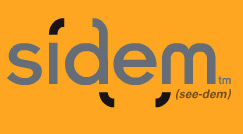Green Event Planning
SIDEM has asked its staff and vendors to think green! Using our team’s creativity and resourcefulness, we have created a list of suggested green practices based on the Environmental Protection Agency’s (EPA) guidelines for meeting planners and modified them to include our recent best practices to make the government’s policies even greener. In addition to providing the option to make your next event more environmentally friendly, SIDEM is looking for ways to make our own office a greener workspace. This initiative will make the SIDEM team more familiar with the best green approaches available. Let’s work together to plan green.
Suggested Green Methods
Conference Registration
- use paper having a significant post-consumer recycled paper content and printed with soy based inks (when possible),
- require that all handouts be double-sided,
- in promotional literature, discourage registrants from renting cars; provide directions on how to reach the hotel by mass transit from airports/major train stations/etc.; provide information on how to receive timetables,
- only provide pens/pencils and notepads upon request,
- use water-based markers & pens instead of permanent inks since less hazardous chemicals are used in their production,
- use electronic or reusable message boards to cut solid waste,
- if plastic name tags are used, set up a system for returning them for reuse at the end of the conference; possibly offer an incentive for returning tags (for instance, a gift might be sent to a certain number of people whose name tags are picked in a raffle; the gifts should be environmentally friendly), and
- provide handouts, PowerPoint presentations, and other conference materials on a web based FTP site or other location for electronic download.
Venue Selection
- offer guests the option of not having sheets & towels replaced each day to save water, energy, and detergents and increase the life of the linens; also offer the option of not replacing partial bars of soap with full bars; set up a system so that housekeeping clearly understands the change in procedures,
- only provide shower caps, sewing kits, shoe buff kits, etc. on request at check-in; again, inform housekeeping,
- only provide newspapers to rooms as requested; do not put newspapers in plastic bags,
- promote and choose hotels that have implemented water and energy conservation measures in place, like special showerheads and key-card activated electric, etc.
- put recycling bins where they are easily accessible; make sure they are clearly marked as to what types of wastes are being collected, and
- prohibit smoking in conference rooms, dining rooms, and common hallways to avoid exposure to second-hand smoke.
Food & Beverage Service
- serve group meals buffet style; offer only 1 size of plates (dinner plates), do not offer salad plates; place utensils at the end of the serving line so that people take only those needed,
- use reusable flatware, glasses, mugs, and plates instead of disposables; choose mugs over cups & saucers (1 item does the work of 2), at meals serve ice water only on request to save water and energy; in meetings have ice water & glasses in the back of rooms instead of on each table,
- eliminate individual sugar packets, condiments, creamers, crackers, etc. to reduce solid waste (as allowed by local health laws),
- for breaks, serve drinks from large dispensers or large bottles (avoid individual bottles or cans whenever possible; when not possible, choose aluminum cans over bottles since they are totally recyclable),
- purchase organic foods & beverages for the health of customers & to support organic gardening,
- eliminate garnishes that most likely will not be eaten, such as lettuce under other foods, sprigs of parsley, etc.,
- increase the number of foods that are low on the food chain, such as fruits, grains, and vegetables, to save energy and resources (the higher up on the food chain, the more energy and resources it takes to produce the food), and
- donate excess food to shelters or give/sell excess food to pig farms to reduce solid waste.



